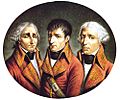Consul facts for kids
A consul is an important official, but the word can mean different things depending on the time period. In ancient Rome, a consul was one of the two highest leaders of the Roman Republic. Today, a consul is a government official who lives in another country to help their own country's citizens.
Contents
What is a Consul?
The word "consul" comes from Latin and means "to deliberate" or "to consult." Throughout history, consuls have played key roles in leading governments and helping people. Understanding the two main types of consuls helps us see how this role has changed over time.
Consuls in Ancient Rome
In ancient Rome, the Roman consul was the most powerful elected official during the time of the Roman Republic. The Republic was a period when Rome was governed by elected representatives, not by a king. This system lasted for nearly 500 years, from 509 BC to 27 BC.
Leading the Roman Republic
Every year, two consuls were elected by the citizens of Rome. They served for only one year, which was a way to prevent any single person from gaining too much power. These two consuls were like the presidents or prime ministers of their time.
Their jobs were very important:
- They led the Roman armies in battle.
- They managed the government and made sure laws were followed.
- They could propose new laws and call meetings of the Senate and the people.
- They also had the power to make decisions about justice and public safety.
The consuls worked together, and each had the power to stop the other's decisions if they disagreed. This was called a "veto," which means "I forbid" in Latin. This system of two consuls with veto power helped keep a balance of power and prevented one person from becoming a dictator. Many famous Romans, like Julius Caesar, served as consul.
Why Two Consuls?
The Romans had two consuls instead of just one leader because they wanted to avoid having another king. After they overthrew their last king, they were very careful about giving too much power to one person. Having two consuls who could check each other's power was a clever way to protect their republic and ensure that decisions were made carefully.
Modern Day Consuls
Today, a consul has a very different job. A modern consul is a government official who works in a foreign country. They are part of their country's diplomatic mission, which means they help manage relations between their home country and the country they are living in.
Helping Citizens Abroad
The main job of a modern consul is to help their country's citizens who are living or traveling abroad. Imagine you are on a trip to another country and you lose your passport, or you get into trouble. That's when a consul can help!
Here are some things a consul might do:
- Issue new passports or emergency travel documents.
- Help citizens who are arrested or in trouble with the law.
- Provide assistance during emergencies, like natural disasters or accidents.
- Help citizens vote in elections from abroad.
- Offer advice and support to citizens living in the foreign country.
- Promote trade and cultural ties between their home country and the host country.
Consuls work in buildings called consulates, which are usually located in major cities of the foreign country. A country might have several consulates in different cities, in addition to its main embassy in the capital city.
Consuls vs. Ambassadors
It's easy to confuse a consul with an ambassador, but they have different roles.
- An ambassador is the highest-ranking diplomat from one country to another. They are the official representative of their head of state (like a president or king) and focus on political relations between the two governments.
- A consul focuses more on helping individual citizens and promoting economic and cultural links, rather than high-level political negotiations. While ambassadors usually work in an embassy, consuls often work in consulates.
Both roles are important for international relations and for supporting a country's citizens around the world.
Images for kids
-
In this painting, Alphonse, Count of Poitiers and Count of Toulouse takes an oath before the Consuls of the town of Agen, with his right hand on the town ordinances, committing himself to recognize the autonomy of the town's commune, while sitting on a pedestal. The consul administering the oath is forced to go on his knees, symbolizing Alphonse's lordship and the town's loyalty.
-
A portrait of the three consuls, Jean-Jacques-Régis de Cambacérès, Napoleon Bonaparte and Charles-François Lebrun (left to right)
 | Jessica Watkins |
 | Robert Henry Lawrence Jr. |
 | Mae Jemison |
 | Sian Proctor |
 | Guion Bluford |




